The Island
 for intense sequences of violence and action, some sexuality and language.
for intense sequences of violence and action, some sexuality and language.
Reviewed by: Michael Karounos
CONTRIBUTOR
| Moral Rating: | Better Than Average |
| Moviemaking Quality: |
|
| Primary Audience: | Teens Adults |
| Genre: | Sci-Fi Action Adventure Thriller |
| Length: | 2 hr. 16 min. |
| Year of Release: | 2005 |
| USA Release: |
July 22, 2005 (wide) |
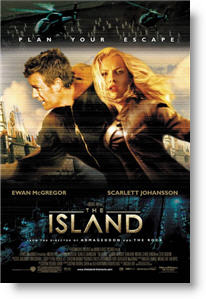

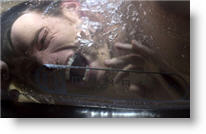
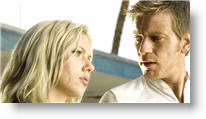


Is the unborn human less than human?
Is it true that “no one knows when life begins”?
Does human life begin at birth?
Is there a difference between being human and being a person? Is an unborn child a person?
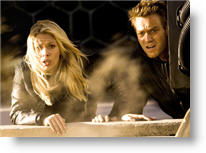
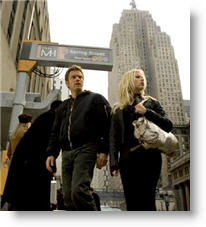
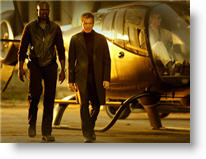
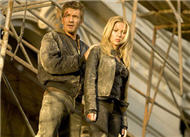
| Featuring |
|---|
|
Ewan McGregor … Lincoln Six Echo / Tom Lincoln Scarlett Johansson … Jordan Two Delta / Sarah Jordan Djimon Hounsou … Albert Laurent Sean Bean … Dr. Bernard Merrick Steve Buscemi … James McCord Michael Clarke Duncan … Starkweather Two Delta / Jamal Starkweather Ethan Phillips … Jones Three Echo Brian Stepanek … Gandu Three Echo Noa Tishby … Community Announcer See all » |
| Director |
|
Michael Bay |
| Producer |
|
Dreamworks Pictures Amblin Entertainment See all » |
| Distributor |
“You have been chosen.” / “They don’t want you to know what you are.”
Here’s what the distributor says about their film: “Lincoln Six-Echo (McGregor) is a resident of a seemingly utopian but contained facility in the mid-21st century. Like all of the inhabitants of this carefully controlled environment, Lincoln hopes to be chosen to go to the “The Island,” reportedly the last uncontaminated spot on the planet. But Lincoln soon discovers that everything about his existence is a lie. He and all of the other inhabitants of the facility are actually human clones whose only purpose is to provide “spare parts” for their original human counterparts. Realizing it is only a matter of time before he is “harvested,” Lincoln makes a daring escape with a fellow resident named Jordan Two-Delta (Johansson). Pursued by the forces of the institute that once housed them, Lincoln and Jordan engage in a race for their lives to literally meet their makers.”
Beginning with “The Matrix”, recent science fiction movies as diverse as the “Planet of the Apes”, “Equilibrium”, and “The Jacket” all construct fascist societies in which there is a victim population that must be brought to awareness in order to be freed. “The Island” adheres to a similar mold, but it also departs from the pattern in that, unlike the latter three films, the oppressive ideology is a secular and not a Christian one.
Indeed, contrary to the criticisms of the movie by reviewers who condemn Bay for being so glib about violence, “The Island” spends the first hour constructing a complicated world in which clones are raised in a combination Club Med/prison facility. What they don’t know is that they exist because some wealthy person—a model, an athlete, an X-sport daredevil—has paid five million dollars for an “insurance policy” that will provide them with the clone’s limbs or organs in the event of disease, accident, or old age.
In the movie’s term, the clones live to be “harvested.” This is the term used in the current stem cell debate in which the crux of the issue is whether it is morally correct to grow and then use the parts of a living being who lacks consciousness in order to improve the life of one that has consciousness. The Princeton philosopher Peter Singer has famously argued for the infanticide of severely disabled babies and euthanasia for incapacitated adults, suggesting that the “personhood” of a human being may not be determinable for 90 days after birth (see ChristianAnswers articles mentioning Singer: Is the unborn human less than human?; Is it better for deformed or handicapped children never to be born?). Similarly, there are organizations arguing for the “personhood” of animals.
At the Institute for Ethics and Emerging Technologies, serious thought is already being given as to how personhood may someday be granted to computers. Christians should be alarmed that the ruling knowledge class in our culture is defining consciousness in ways that excludes several categories of people while simultaneously including categories of animals and machines.
These are deadly serious issues and as such frame the first hour of “The Island” as a serious film that stands apart from the second, explosion-filled hour. This review won’t concern itself with the explosions, crashes, and various acts of mayhem, because they exist merely to justify a rating, to ensure a demographic, to promote the Bay brand. No preacher can preach to an empty auditorium, and Michael Bay, a graduate of Wesleyan University, is surely preaching. The question is, what is his message, and is it compatible with a Christian worldview?
A prominent media critic at Newsweek dislikes Bay’s movies and writes: “‘The Island’ seems like a PSA by religious conservatives about the slippery slope of saving people from Parkinson’s disease.” Several critics, reflecting their cultural bias, have responded negatively to the seeming anti-abortion, anti-stem cell harvesting message of the movie. Clearly, the images support such an interpretation and constitute the film’s clearest exposition of ideas: aborting life and harvesting life for selfish purposes is bad. For those resistant to accepting this interpretation of the film’s rhetoric, Michael Bay himself makes clear the intent of the film in an interview with Dark Horizons:
“Lots of sci-fi movies are much ado about nothing. What I liked about [“The Island”] is that it’s a universal thing: we all want to live longer. But how selfish would you be to achieve that? You could get a liver, a heart, kidneys, essential things. But I wanted to show people going for things that were just so crass, like fresh skin for a face-lift. For some woman who doesn’t want to go through the pain of childbirth and have stretch marks, why not have your clone birth for you? How disgusting is that?” —http://www.darkhorizons.com/news05/island2.php
Implicitly, Bay indicates that his science fiction movie is much ado about something. Really, it is about two things: the sanctity of human life on the one hand, and the inhuman, impersonal selfishness of certain types of human persons—models, athletes, and politicians. Furthermore, Bay cleverly indicts—by conspicuously leaving them out—the category of persons that most quickly comes to mind when discussing facelifts, liposuction, Botox, transplants, and collagen injections for puffy lips: the denizens of Hollywood.
“The Island” simultaneously supports traditional liberal and conservative values while critiquing the kind of post human society that wants to expand the choices of what is human even while tyrannically determining what humans are permitted to do. This is why Lincoln Six Echo (Ewan McGregor) at one point rebels and asks why they must eat certain foods and not others, why must they dress in white, why can’t they make decisions for themselves? The reason is because they live in a totalitarian state in which all these decisions are made for them by a ruling knowledge class that knows best what is good for society and hence for them as individuals.
The movie’s conflict is between a classic liberalism that is compatible with religious belief and a secular postmodernism that is not. Thus, Dr. Merrick (Sean Bean), the scientist in charge of the entire project, pronounces, “In two years I will be able to cure childhood leukemia. How many people can say that?” “Just you and God,” responds Albert Laurent (Djimon Hounsou), the French mercenary.
Dr. Merrick promises the clones: “Nature has left you a garden of Eden to repopulate!” By doing so, he figures Nature as the film’s god. In those two quotations, Bay illustrates the film’s antithetical values between science and faith, between a secular worldview and a religious one. As Bean says of his character in an interview, “He’s also got a Godlike factor in him, playing God.”
The most striking exposition of religion in the film is accomplished through a visual contrast of captures. One of the methods in which the guards restrain violent “products” is to shoot miniature harpoons into them and then reel them down the hall. The premise of such a weapon is so ludicrous that it defies credibility: how do you drag the huge Michael Clarke Duncan across the floor, against his will, by means of hooks in his flesh? Clearly, the laws of physics would require the hooks to tear out. That this expedient is used on three separate occasions in the movie is both annoying and purposeful. As I remarked hopefully to my wife, “It has to mean something.”
Indeed, not until another unbelievable sequence in the second hour can we understand the meaning of the fishhooks and reeling guns. When McGregor and Johansson fall from a skyscraper, they improbably plunge through the destructive wreckage and land safely onto a large net. The black construction worker (blacks are the only acceptable Christians in liberal myths) pulls them out and smilingly says to McGregor, “Jesus must love you.” When he pulls out the lovely and busty Johansson he intones facetiously, “I know that Jesus loves you.” The moment plays for a laugh that distracts attention from a key metaphor. What are the two ways to catch fish? With a hook or a net.
Secular science uses the hideous violence of a hook in the flesh of another human to fulfill what McCord (Steve Buscemi) proclaims is “the new American dream”—to “live forever.” The promise of eternal life through Christianity is secured with the “net” of belief that “Jesus loves you” and doesn’t require victimizing another human being.
Those contrasting elements are the clearest exposition of the film’s worldview and argue strongly for a perspective on life that—if not actually Christian—is sympathetic to a Christian position.
But Bay is nothing if not ambitious in this movie and throws a dollop of social commentary on race into the thematic blender. In the beginning of the film I wondered whether “Lincoln” would be the liberator of the slave race. There is a liberation of slaves here, but the film, from a racial perspective, most clearly resembles I, Robot. In both films there is a type of “Magic Negro” character who liberates a “white” race that is enslaved by their cultural conditioning.
In “The Island”, all the clones wear white shirts, white pants, and white shoes and live in a “white” environment: controlled, programmed, sexless. The ruthless mercenary, Albert Laurent (Djimon Hounsou), undergoes an ideological conversion when he sees the brand on Jordan Two Delta’s (Johansson’s) wrist. He displays a brand on his own palm and in doing so references one of the signature images in Tim Burton’s “Planet of the Apes” where humans, representing American slavery, were branded with a twisted cross to show the tyranny of Christianity. Bay undoes that liberal myth here because it is a secular tyranny that brands the clones, that uses them for parts, that says they are without souls (as humans were said to be without souls in Planet).
Laurent’s mercenary heart is converted and he helps Jordan Two Delta by killing one of the guards. Based on that minor action, Bay idealizes the character and shows Jordan and Lincoln staring in close-up at Laurent as he heroically strides into the sunset in slow motion. It is an attempt at an epic moment, but it is so weakly supported by the action that one again suspects Bay of satirizing the moment and the mechanism instead of employing it.
The film concludes with one last metaphor, a reference to the film’s first scene in which Lincoln dreamed of himself and Delta floating on the sea in a beautiful yacht called Renovatio. Dr. Merrick helpfully informs us that this is Latin for “rebirth.” Lincoln and Delta and all the clones who escape the containment center and who were born only as “tissue” and “product” are reborn as persons. There is a lovely consonance of imagery as they escape in waves of white figures across the red earth. The desert is like a sea and each of the little figures floats across it like sail boats, finally free. Or, to use another metaphor from the movie, they are like the moth that Lincoln set free earlier: so many papillons fleeing with their arms outstretched from the prison island of the containment center.
The clones are transformed from so many products on a shelf into real people. The film implies that rebirth is not physical, nor merely intellectual, but consists of the one that is humanity’s alone of all the species on Earth: a spiritual one.
Ultimately, the meaning of “The Island” is that it is an isolated state of mind, one that exists artificially in an inhuman landscape of ideas and that denies personhood to human beings in the service of power, privilege, and wealth. I believe that Bay is arguing that such people, like those found among the beautiful celebrities of our time, think that life is expedient to their needs and are blind to the monstrous consequences of their selfish desire to live longer, more beautifully, more perfectly. It is they who live on an island.
Excepting the silly action sequences, which don’t make much sense, “The Island” is a cleverly-executed film that attempts to answer an increasingly important question: what is a human life? Its answer is consonant with classic liberal and Christian thought and is the reason why Christians should see the film.
(Objectionable content: One “F” word, one “s” word, one “a” word, and a love scene with Johansson partly shown in a bra.)
See list of Relevant Issues—questions-and-answers.


While making this film, Michael Bay went to many senators and got their advice on what approach he should take and most notably he got the biggest support against cloning from our Republican Senators at Capital Hill.See all »
Better than Average/4½
Morally, I saw very little to object to. The main characters grew up in an environment that prohibited their exposure to sex (they don’t have any idea what it is, or have a desire to find out). Language, there were a few scattered d*** and a**, and only one use of the F-word. By today’s standards, that’s amazing.
Overall, I was very impressed with the action sequences, the special effects, the acting, and the morally sound yet frightening plot line.
Average/4
It raises several moral questions about the legalities and ethics of cloning, and in a surprising opposite of typical Hollywood, takes the correct moral stand on this issue. A major idea within the film is that life is valuable, and the point is well-made. By the end, I imagine even an individual who supports human cloning might think twice about his/her beliefs.
The action sequences are thrilling; the special effects are incredible. Interlaced with these details is a bit of well-placed comedy that provides a brief moment of relief for the audience, who throughout the rest of the film does not ever get a chance to relax. This is the best movie I’ve seen all year, and gives the viewer an almost interactive encounter.
The excessive action violence and images from the laboratories (as well a one use of the f-word) may be disturbing to younger viewers, but my 16-year-old brother and I had an absolutely wonderful time. I will add this DVD to my collection when it is released. “The Island” is a must-see for the summer!
Good/4
Better than Average/4
Overall, it was time and money well spent. If you are not sure that you want to spend the time or the money, I would like to recommend watching the music video by D.C. Talk, Consume Me. Its the same basic idea without all the profanity, action, or sex in less than ten minutes.
Better than Average/4½
I was also touched by the desire of Lincoln and Jorden to return to save their friends even though it most likely meant their deaths. Well, I went home and told my husband he had to go see it with me. So we went and again I was just struck by that scene of the light coming in and people rushing to it. But what also struck me was when they did the synoptic scan on Lincoln. They said he had memories that he had no reason to have. That just made me think of how the Holy Spirit gives us wisdom that is not of our own and that we have everything we need inside of us because of who Christ is in us… not from the outside world. The outside brings death and destruction, but when we tap into Jesus in us, we have that life (the Island) and life more abundantly… not the death that we know awaits those who reject Jesus. I recommend this movie, because anyone who has the Spirit of God in them will receive what the Spirit wants to say to them through it.
Better than Average/4½
Better than Average/5
This is a movie that every 20-something and highschooler and high school youth group in America should watch and discuss, because it brings to life (pun intended) and makes personal the often-impersonal questions from the current debates about stem-cell research, cloning, abortion, and genetic engineering: what is the definition of “human”? What is the value of a single human life? Who gets to decide these answers?See all »
Better than Average/5
As far as the product placement complaint, if movies can be made this well with a pro-life view (Hanz Zimmer-music, Bay—Director, Ewan—Actor, Scarlett—actress, ILM—Special Effects), then I say do whatever it takes to fund the project so long as it doesn’t take away from the story and movie. I have always thought the lack of using any products which has long been the norm in Hollywood is more of a distraction. How many times have we seen “Cola” on the side of a can in a movie. Cmon, call it what it is a coke or a pepsi. Anyhow back to my main point.
Any movie that portrays ALL human life as precious is a good start for Hollywood. Some who have seen it might argue but if you truly think about it. Every intentional death in the movie was caused by the antagonists of the film. Especially encouraging was the value given to the unconscious and humans not yet born so to speak. Even those living in the “other world” were looked on as children and innocent. I couldn’t help but think of abortion. The most obvious scene was the termination of the clones with abortion like procedures. If anyone knows anything of how an abortion is performed this most likely brought tears to your eyes. Perhaps I am the only one here but I urge anyone who didn’t see this to take another look at the movie. It seemed painfully obvious to me what was being portrayed. The movie did have some graphic violence which would make it most definitely unsuitable for younger viewers but the values and lessons taught reinforce the sanctity of our God given lives. Prayerfully many will see this film and consider the importance of life.
Better than Average/4½
I do not need to explain the plot of clones being made to think they are being chosen to go to paradise but in realty are being lied to so they can be harvested for spare body parts to their rich “sponsors” or “real people.” I was treated to a fantastic film whose message was that life is sacred and not to be destroyed. The McGregor and Johanssen characters in my eyes throughout the film represented the innocent children who are being murdered each and everyday because the world either does not realize or chooses to ignore the fact that they are living people…“The Island” takes you from the realization of the truth about the Island to the escape of Jordan 2 Deta (Johannsen) and Lincoln Six Echo (McGregor).See all »
Extremely Offensive / 5
So its not the plan of the heavenly father for us to cheat death in the present world on our own efforts. The movie does have an evolutionary comment when the narrator says we were around for billions of years evolving. Aside from the science-fiction stunts it was a very thought provoking movie and an eye opener from a philosphical point of view.
Better than Average/5
Average/3
The second half of the movie is typical Bay: loud, over-the-top, violent action. Almost non-stop. And it’s made all the more unsatisfying by his trademark shaky camerawork (where you can’t really see what’s happening in the fight/chase). I thought there were only so many chases/crashes/explosions/fights a movie could believably handle… but Bay has blown that idea out of the water for me. I felt pummeled by all of the action sequences by the end of the movie.
But here’s my BIG gripe: Bay, a former commercial director, uses “The Island” for mass product placement. This enrages me! “Aquafina”, “Puma”, “Microsoft”, “Speedo”, “Cadillac”…you are literally assulted by images of product logos. That alone makes me not want to recommend this movie. When entire shots are intended JUST to display a product, we’re no longer watching a movie, but a commercial. It’s bad enough we have to see them before the movie… I can’t stand them IN the movies. After all that, I’d have to say that “The Island” is, by far, Bay’s best work yet (which isn’t saying much). If you like science-fiction that makes you think, you’ll enjoy the first half. If you like video game-style non-stop action, you’ll like the second half. If you enjoy the commercials on TV more than the shows, you’ll love the shameless product placement. Enjoy “The Island”! It was painstakingly created to meet all your summer blockbuster entertainment requirements!
Average/4
…I took my wife out to our first movie in 3 years. …I was horrified by the grotesque violence in the movie and felt ashamed that I had exposed my wife to a date by going to this show… Having said that, I do not want to take away from the very positive areas of the movie. I would probably watch it myself on DVD without the 30 minutes of highly objectionable advertising and without having my wife’s sensitive and gentle heart exposed to this movie.
The theme of the movie: “Playing God with life and death does not belong to Merck’s doctors or any other RU486 proabortion drug dealers.” What a wonderful and clear message. No wonder Newsweek’s pro-death critics spoke out so strongly against the movie, even though the movie had a slight reference to our “dumb president” who would clone himself. Shows you how “unbiased” critics are ! I hope honest critics would agree that we should not trust so easily drugmakers’ money driven decisions on our behalf, specially in the areas of cloning and stem cell “research”!See all »
Offensive/5
Better than Average/3½
Average / 3
Average / 4
Average / 5
Better than Average / 4½
Better than Average / 4
PLEASE share your observations and insights to be posted here.
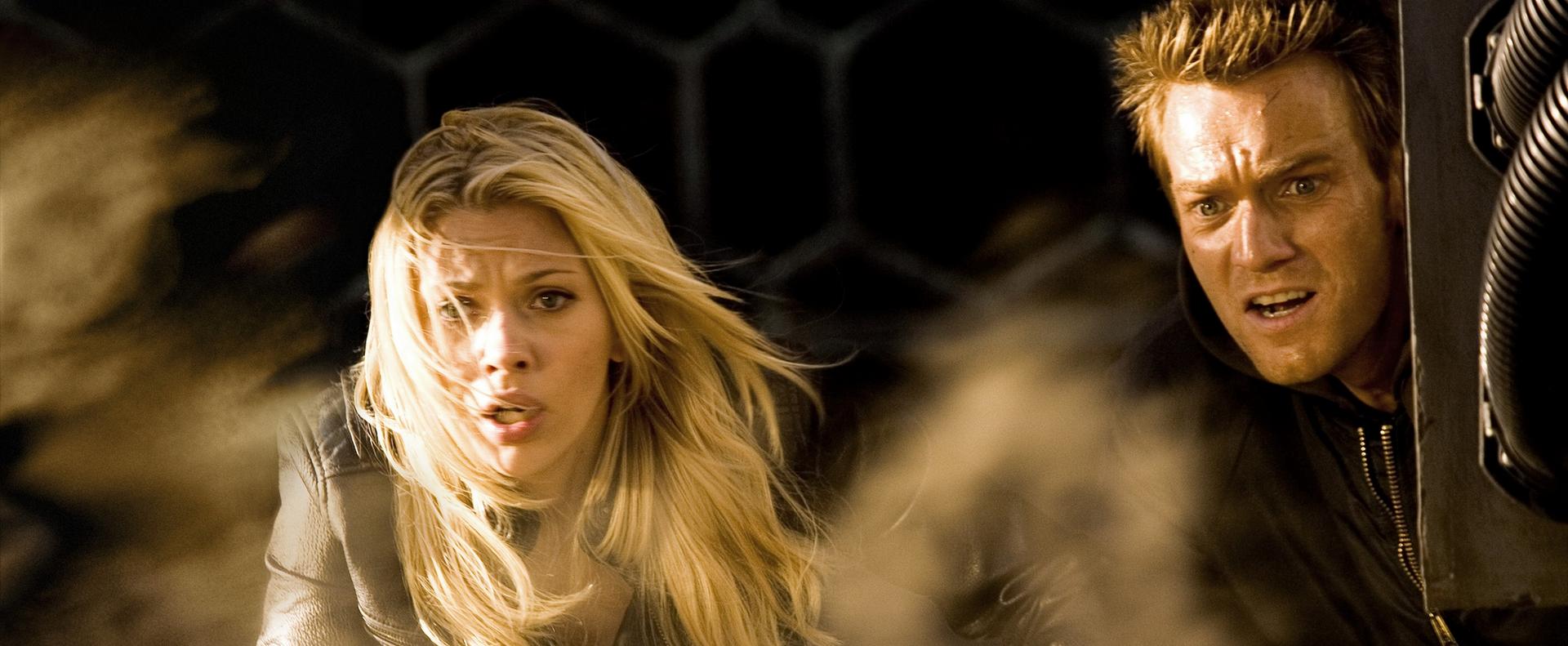


Plus, it strongly protests humans playing God. At one point a character says “in a few years I will be able to say, I can cure childhood cancer! Who else can say that?” To which, the sarcastic response is “Only you and God I suppose, but that is what you wanted all along.” All in all, I really enjoyed this film. It does, however, have many violent and frightening scenes and one of sexuality. NOT RECOMENDED FOR THE YOUNGER CROWD.
My Ratings: Offensive/4½